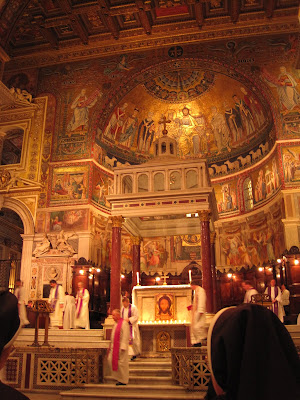From the viewpoint of the media, it is an opportunity to show that seminarians and priests can participate in competitive sport in a virtuous manner, contrary to much of what professional sport offers these days. From our standpoint, it is an excellent opportunity to build fraternity with brother seminarians, both those from your own college and other colleges as well. For months, from January to April/May, we practice twice a week, often including rigorous conditioning, in order to prepare for the tournament. I've found that few other things build fraternity as well as conditioning and training week in and week out with the same group. Although our immediate goal is to win the tournament, ultimately we do this for the glory of God. To engage in healthy, friendly, competitive sport is an excellent way to put into practice the fullness of humanity--to manifest God's creation of the human person in the way the Father intended it. Personally, it doesn't get much better than playing my favorite sport, one of my great passions, in the shadow of the dome of St. Peter's basilica in Rome.
Check out the PNAC Clericus Cup website for a review of last season, including photos, videos, and more! You can also take a look at recent news coverage from the NY Times and Fox Sports.
This year, the organizations that run the Clericus Cup pulled together a pool of the "all-stars" of last year's tournament to play against local teams in Rome. Myself, and 2 other men from the PNAC played with men from a number of other seminaries in Rome, including the Brazilian college, Polish College, Rome's Pontifical College for mission countries, and Redemptoris Mater (community of the Neo-Catechumenal way). Our first match was played against the Guardia di Finanza, Italy's branch of the police that deals with currency and other financial matters. The purpose of organizing an all-star team was to show, once again, that "another soccer is possible," as it was phrased by the advertisers. That is to say, through the inspiration of the priests and seminarians who participate in the Clericus Cup, soccer can be played with both a competitive and charitable attitude. This is an especially important message for Italy, and many other countries where soccer is so popular, in which soccer matches can quickly turn into arenas for political campaigning (as is displayed by fascist groups in Italy), hooliganism, and violence. The message that sport can be a way to build bridges and friendships between nations and cultures was evident, at least for the Clericus Top all-star team, as I was able to meet and make friends with other men studying for the priesthood in Africa, South America, Europe, and Asia. Our match against the Guardia di Finanza was quite an extravagant and highly publicized event for what I thought to be an insignificant game in the eyes of the secular world--for that reason, I was pleasantly surprised. In fact, Giovanni Trapattoni, the manager of the Ireland national team, was scheduled to coach us for the day, but was unable to attend at the last minute. The first few hours were spent in a press conference, followed by the match itself, and topped off with a casual dinner hosted by the Guardia di Finanza.
Here is a picture of the team in full taken from an ABC News-Spain article (for our Spanish speakers):
 and a slide show of the events from the Clericus Top website.
and a slide show of the events from the Clericus Top website.In the end, it was a great day. For a morning, I felt like a professional, like Steven Gerrard in his early days, but it was important to remember that our purpose, as it is in all that we do, was to glorify God.
_by_Benjamin_West.jpg)







































